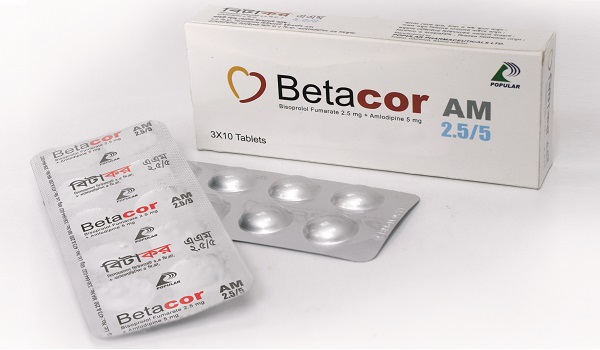Indication
Betacor AM is indicated for the treatment of hypertension as substitution therapy in patients adequately controlled with the individual products given concurrently at the same doses level as in the combination, but as separate tablets.
Dosage & Administration
Recommended daily dose is one tablet of the given strength. Treatment must not be
abruptly discontinued, as it may lead to temporary deterioration of clinical condition.
Treatment must not be abruptly discontinued especially in case of patients suffering
from ischaemic heart disease. Gradual decrease of the dose is recommended.
PATIENTS WITH HEPATIC IMPAIRMENT: In case of hepatic impairment elimination of
amlodipine may be elongated. Exact dosage recommendations concerning amlodipine
have not been established, but the drug should therefore be administered with special
caution in these patients. In case of severe hepatic impairment the daily dose of
bisoprolol must not exceed 10 mg.
PATIENTS WITH RENAL IMPAIRMENT: No dosage adjustment is required for patients
with mild to moderate renal impairment. Amlodipine is not dialyzable. Amlodipine should
be administered with particular caution to patients undergoing dialysis. In case of severe
renal impairment (creatinin clearance < 20 ml/min) the daily dose of bisoprolol must not
exceed 10 mg.
ELDERLY PATIENTS: The usual doses can be administered to elderly people; however,
caution is advised when the dose is increased.
PAEDIATRIC POPULATION: The safety and efficacy of Betacor AM in children and
adolescents below the age of 18 years have not been established. No data are
available.
METHOD OF ADMINISTRATION: Betacor AM should be taken in the morning with or
without food, without chewing it.
Precautions
IN CONNECTION WITH AMLODIPINE: The safety and efficacy of amlodipine in
hypertensive crisis has not been established. Patients with cardiac failure: patients with
heart failure should be treated with caution. in a long-term, placebo controlled study in
patients with severe heart failure (NYHA class lll and lV) the reported incidence of
pulmonary oedema was higher in the amlodipine treated group than in the placebo
group, but this was not associated with worsening of the heart failure. Use in patients
with impaired hepatic function: the half-life of amlodipine is prolonged in patients with
impaired liver function; dosage recommendations have not been established.
amlodipine should therefore be administered with caution in these patients. Use in
elderly patients: in the elderly increase of the dosage should take place with care. Use
in renal failure: amlodipine may be used in such patients at normal doses. changes in
amlodipine plasma concentrations are not correlated with degree of renal impairment.
amlodipine is not dialyzable.
IN CONNECTION WITH BISOPROLOL: Especially in case of patients suffering from
ischaemic heart disease the cessation of therapy with bisoprolol must not be done
abruptly unless clearly indicated, as it may lead to temporary deterioration of heart
disease. Bisoprolol should be administered with special caution in patients with
hypertension or angina associated with heart failure.
BISOPROLOL MUST BE USED WITH CAUTION IN: Diabetes mellitus with large
fluctuations in blood glucose values; symptoms of hypoglycaemia (e.g. tachycardia,
palpitations or sweating) can be masked. Strict fasting/diet. Concomitant
desensitisation therapy. As with other beta-blockers, bisoprolol may increase both the
sensitivity towards allergens and the severity of anaphylactic reactions. Adrenaline
treatment may not always give the expected therapeutic effect. First degree AV block.
Prinzmetal's angina. Peripheral arterial occlusive disease (intensification of
complaints might happen especially during the start of therapy) Patients with psoriasis
or with a history of psoriasis should only be given beta-blockers (e.g. bisoprolol) after
carefully balancing the benefits against the risks. Under treatment with bisoprolol the
symptoms of hyperthyreosis may be masked. In patients with phaeochromocytoma
bisoprolol must not be administered until after alpha-receptor blockade. In patients
undergoing general anaesthesia beta-blockade reduces the incidence of arrhythmias
and myocardial ischemia during induction of anaesthesia and intubation, and the postoperative
period. It is currently recommended that maintenance beta-blockade be
continued perioperatively. The anaesthetist must be aware of beta-blockade because of
the potential for interactions with other drugs, resulting in bradyarrhythmias, attenuation
of the reflex tachycardia and the decreased reflex ability to compensate for blood loss.
If it is thought necessary to withdraw beta-blocker therapy before surgery, this should
be done gradually and completed about 48 hours before anaesthesia. In bronchial
asthma or other chronic obstructive lung diseases, which may cause symptoms,
bronchodilating therapy should be given concomitantly. Occasionally an increase of the
airway resistance may occur in patients with asthma, therefore the dose of b2-stimulants
may have to be increased.
Use in Pregnancy & Lactation
PREGNANCY: Bisoprolol has pharmacological effects that may cause harmful effects
on pregnancy and/or the foetus/newborn. In general, b-adrenoceptor blockers reduce
placental perfusion, which has been associated with growth retardation, intrauterine
death, spontaneous abortion and early labour. Adverse effects (e.g. hypoglycaemia and
bradycardia) may occur in the foetus and newborn infant. If treatment with badrenoceptor
blockers is necessary, b1-selective adrenoceptor blockers are preferable.
The safety of amlodipine in human pregnancy has not been established. Reproductive
studies in rats have shown no toxicity except for delayed date of delivery and prolonged
duration of labour at dosages 50 times greater than the maximum recommended
dosage for humans. Betacor AM is not recommended during pregnancy unless clearly
necessary. If treatment with Betacor AM is considered necessary, the uteroplacental
blood flow and the foetal growth should be closely monitored. In case of harmful effects
on pregnancy or the foetus alternative treatment should be considered. The newborn
infant must be closely monitored. Symptoms of hypoglycaemia and bradycardia are
generally to be expected within the first 3 days.
BREAST-FEEDING: It is not known whether bisoprolol or amlodipine is excreted in
human milk. Therefore, administration of Betacor AM is not recommended during
breast-feeding.

